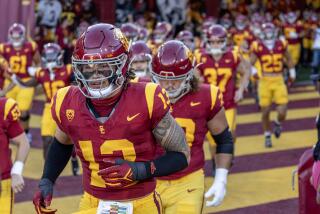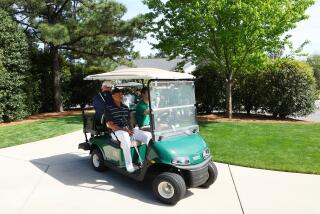Making His Case
- Share via
It was the kind of drama you will never find on a golf course, regardless of the magnitude of the event.
Casey Martin, the promising young golfer who has spent the last several months trying to convince the world that he should be allowed to ride in a cart while competing professionally, hobbled into court Monday in Eugene, Ore., and graphically embarked on a campaign to convince the federal magistrate who ultimately will decide his fate.
Martin, 25, a member of Stanford’s 1994 NCAA championship team and a former teammate of Tiger Woods, is using the Americans With Disabilities Act as the basis of his lawsuit seeking to ride a cart on the PGA Tour.
And on the first of several days of testimony, he showed the judge a video in which he described his atrophied leg and pain so severe he called it a “nightmare.”
Many in attendance cringed at the sight of Martin’s right leg, which is shrunken from a rare circulatory disorder, pale from years under support hose and bulging with purple veins.
“You can see how it is just bone and skin,” Martin said as he pulled back the hose. “Every time I walk, I feel it. At the end of the day, it throbs like a person who has just run a marathon.”
After Martin’s testimony, his orthopedic surgeon gave a detailed explanation of Klippel-Trenaunay-Weber Syndrome, which the golfer has had since childhood.
Martin doesn’t have the vein that runs along the bone in his lower leg. Blood returning to his heart goes through a jumble of veins near the surface. When they are stressed, they bleed into his knee.
He wears a support stocking to force the blood up his leg, but the problem has caused the muscles and bones of his lower right leg to atrophy. Walking aggravates the condition and could result in him breaking his lower leg, which could result in amputation.
“It’s so painful to walk,” Martin said, “[but] when I ride at least it gives it a reprieve.”
Martin’s plight won the sympathy of many long before his case reached the magistrate. It has been a matter of heated debate on the fairways as well as on the 19th hole of many a public golf course.
At issue, in essence, are these two arguments:
* Walking is and has always been part of professional golf. To allow Martin to ride in a cart, regardless of his disability, would strike a blow to the sport’s tradition and would give one golfer an unfair advantage over hundreds of fellow competitors.
* Martin is already at a disadvantage because one leg is much weaker than the other and weakens more with every step. Being able to ride in a cart would merely help put him on a level playing field with others.
While the PGA Tour--and many of its players--acknowledges that Martin is disabled, it has maintained that it supports the status quo largely in the interest of fairness to the competitors who must walk 72 holes every week, regardless of their ailments.
Also at issue, PGA Tour lawyer William Maledon pointed out, is whether the tour has the right to establish its own rules.
“This is a rule that the evidence will show exists with respect to virtually every major golf tournament around the world,” he said.
One of the first witnesses for the PGA Tour will be Ken Venturi, who walked to victory in the 1964 U.S. Open despite almost collapsing from heat exhaustion. Videotaped testimony from golfing greats Arnold Palmer and Jack Nicklaus also will be shown.
Last week, Martin won the first round in the legal battle when U.S. Magistrate Thomas Coffin refused to throw the case out. The PGA Tour had argued that the disabilities act does not apply to the case.
Coffin ruled the PGA Tour is a commercial enterprise, not a private club that would be exempt from the act. He also found that golf courses used for tournaments by the PGA Tour are places of “public accommodation” under the act.
Martin missed qualifying for the PGA Tour last year by two shots.
Given the chance to ride a cart on the second-tier Nike Tour, pending the outcome of this trial, Martin last month won the Lakeland (Fla.) Classic and was embraced by many for his underdog battle against a tradition-laden sport.
“From a public opinion standpoint, it’s a loser,” PGA Tour Commissioner Tim Finchem acknowledged before heading into court. “This is a very unfortunate system we find ourselves in, having to litigate whether a fellow we think a great deal of can play the game.”
Finchem said if there was a way to accommodate Martin without giving him an advantage over other golfers, he would, but “you can’t write different rules and make everything the same. . . . We’re looking at the fairness of the sport.”
Any ruling against the PGA Tour will not affect the four major tournaments: the Masters, U.S. Open, British Open and PGA Championship. All are outside the jurisdiction of the tour.
*
The Associated Press contributed to this story.
More to Read
Sign up for Essential California
The most important California stories and recommendations in your inbox every morning.
You may occasionally receive promotional content from the Los Angeles Times.












